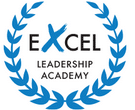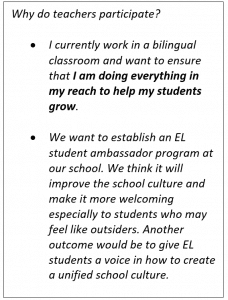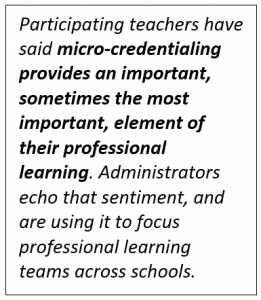Becoming an Effective Educator of English Learners: Job-Embedded, Competency-Based Professional Development for All Teachers
CompetencyWorks Blog
 Ask any public-school teacher across the country about their greatest challenge. They are likely to tell you it is a lack of confidence in their own ability to work with students in their classes who may not speak English, sometimes representing vastly different cultures. The ExcEL Leadership Academy recognized the need for a better approach to professional learning that would prepare all teachers to work with English Learners.
Ask any public-school teacher across the country about their greatest challenge. They are likely to tell you it is a lack of confidence in their own ability to work with students in their classes who may not speak English, sometimes representing vastly different cultures. The ExcEL Leadership Academy recognized the need for a better approach to professional learning that would prepare all teachers to work with English Learners.
 The number of English learners in schools in the United States continues to grow. English learners present particularly diverse and intensive challenges for educators – some students are recent arrivals with limited or formal interrupted schooling, others were born in the United States but lack the academic language required for school success even after many years of ESL support. Many have complicated, interrelated difficulties with literacy in two (or more) languages. At the same time, schools are challenged to locate, hire, and retain specialist English as a Second Language (ESL) teachers. Even in schools well-staffed with bilingual and ESL instructors, the average student spends less than fifty minutes per day engaged in English language instruction. That means more than 80 percent of their time is spent in the mainstream classroom. Much of that 80 percent is spent with well-intentioned, hard-working teachers who know their subject area well, but who know little or nothing about how to scaffold their academic content so ELs can make sense of it. For students who are dually struggling with new concepts AND new language, this context often results in a cycle of lagging achievement, failure, and remediation. Under-prepared teachers are engaged in the same downward cycle, as their skill and confidence fail to grow along with the diversity of the students in front of them.
The number of English learners in schools in the United States continues to grow. English learners present particularly diverse and intensive challenges for educators – some students are recent arrivals with limited or formal interrupted schooling, others were born in the United States but lack the academic language required for school success even after many years of ESL support. Many have complicated, interrelated difficulties with literacy in two (or more) languages. At the same time, schools are challenged to locate, hire, and retain specialist English as a Second Language (ESL) teachers. Even in schools well-staffed with bilingual and ESL instructors, the average student spends less than fifty minutes per day engaged in English language instruction. That means more than 80 percent of their time is spent in the mainstream classroom. Much of that 80 percent is spent with well-intentioned, hard-working teachers who know their subject area well, but who know little or nothing about how to scaffold their academic content so ELs can make sense of it. For students who are dually struggling with new concepts AND new language, this context often results in a cycle of lagging achievement, failure, and remediation. Under-prepared teachers are engaged in the same downward cycle, as their skill and confidence fail to grow along with the diversity of the students in front of them.
These urgent needs led to the development of the new (and much better) approach to teacher learning embodied in the Effective Educator of English Learners micro-credential. The Effective Educator program emerged from a peer network looking for effective ways of delivering meaningful, accountable professional development that positively impacts student outcomes. Designed from the ground up, it represents a significantly better approach to teacher learning and credentialing.
The Effective Educator of English Learners micro-credential is awarded when teachers have broadened their professional knowledge and skill in five areas:
- applying second language acquisition theory;
- using instructional strategies in the classroom to support English Learners;
- using effective and equitable formative assessments to support English Learner growth;
- supporting programs and strategies that empower English Learners; and
- supporting programs and strategies that build welcoming, inclusive school cultures.
 Teachers earn skills-based badges when they demonstrate mastery in these areas. For example, educators might choose to focus on building a school culture characterized by engaged families who are partners in their child’s education. Teachers choose their own pathway to building family engagement as a way of establishing a welcoming and inclusive environment. As they explore ways of reaching competence they have the support of an online community of educators and national experts to help shape their work, solving problems and offering suggestions and resources along the way. Ultimately their mastery demonstration (often a video) adds to a growing library of resources available for others to learn from.
Teachers earn skills-based badges when they demonstrate mastery in these areas. For example, educators might choose to focus on building a school culture characterized by engaged families who are partners in their child’s education. Teachers choose their own pathway to building family engagement as a way of establishing a welcoming and inclusive environment. As they explore ways of reaching competence they have the support of an online community of educators and national experts to help shape their work, solving problems and offering suggestions and resources along the way. Ultimately their mastery demonstration (often a video) adds to a growing library of resources available for others to learn from.
Micro-credential programs in education are redefining the concept of professional development. Teachers are no longer required to complete endless hours of workshop or classroom study that may or may not be useful to them. Instead this approach recognizes and rewards the development of tailored best practice that demonstrably improves student outcomes. It is competency-based, personalized, hands-on, project-based mastery learning for teachers.
Educators earn (and proudly display) the Effective Educator of English Learners designation. The next challenge is transforming the highly traditional and outdated credentialing process in states and districts across the country so that Effective Educators are recognized, and compensated, for their accomplishments. We welcome partners on this journey at all levels. For more information on becoming an Effective Educator of English Learners visit https://www.excelleadershipacademy.org/pages/micro-credential/.
See also:
- Equity for ELs: Learning English in a Competency-Based System
- 5 Things I Learned While Scoring Micro-credentials
- Moving from Current Models of Teaching English Language Learners to New Learning Models Designed to Meet the Needs of All Students
Laureen Avery is the Director of the Northeast Regional Office of UCLA’s Center X, the home of Project ExcEL. She provides technical assistance, coaching and research services to public school districts in New England, with a focus on improving outcomes for English learners in high-poverty schools. You can reach her at [email protected], or @uclaEXCEL.